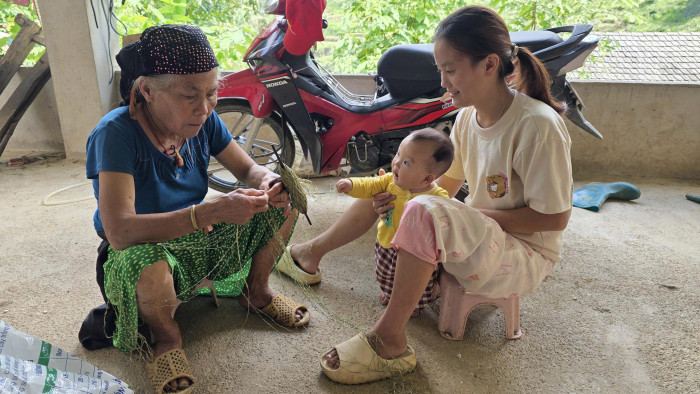17/09/2025 - 3:01 pm
0
As part of the Early Journey of Life (EJOL) Program, from August 8–13, 2025, the RTCCD working team conducted a field visit to two communes, Tung Vai and Quan Ba. This journey was not only an opportunity to listen to the stories of H’Mong, Dao, and Nung families, but also to explore sustainable solutions for […]
As part of the Early Journey of Life (EJOL) Program, from August 8–13, 2025, the RTCCD working team conducted a field visit to two communes, Tung Vai and Quan Ba. This journey was not only an opportunity to listen to the stories of H’Mong, Dao, and Nung families, but also to explore sustainable solutions for integrating positive parenting practices into both healthcare and community services.
Household immersion (August 8–10, 2025):
Four team members – representing psychology, public health, communications, and preventive medicine – lived with four households from H’Mong, Dao, and Nung ethnic groups. Shared meals, sleepless nights, and natural parenting practices in the mountains were carefully observed and documented, offering valuable insights into daily child-rearing realities.
Work with health staff and community (August 11–12, 2025):
RTCCD engaged with 24 couples, commune health workers, and village health collaborators to discuss integrating positive parenting practices into the Expanded Immunization Program.
Consultation with leadership (August 13, 2025):
Meetings were held with the Provincial Department of Health, CDC, and local TV & Radio Station to introduce the EJOL program, discuss sustainable implementation, localized communication, and necessary adjustments.
2.1 Nutrition and living standards
Children from Dao and Nung families generally had more diverse diets compared to H’Mong children, due to better access to local food resources. However, many H’Mong mothers still lacked proper nutrition knowledge during pregnancy, relying mainly on corn and watery vegetables. This results in poor maternal nutrition and insufficient breastmilk. Practical solutions include producing simple, visual guides (such as local cooking videos) to show how to diversify meals using readily available protein-rich foods.
2.2 The role of fathers in childcare
In most families, childcare is primarily managed by mothers and grandmothers, while fathers work far from home. Although men are generally kind and non-violent, emotional bonding between fathers and children is weak. The program aims to encourage fathers to join in daily moments—mealtime, play, and conversation—helping children feel loved by both parents.
2.3 Early stimulation and school readiness
Children rarely receive praise, conversations, or access to books and educational toys, which negatively affects communication skills and self-confidence at school age. Future communication materials will focus on teaching parents how to praise effectively, use positive discipline, and create DIY educational toys from local materials to spark curiosity and readiness for school.
2.4 Child safety in ethnic minority communities
Children often play near streams and irrigation canals without supervision, posing risks of drowning and injury. The proposed solution is to produce instructional videos on basic first aid, while spreading safety awareness at both household and community levels.
2.5 Hidden risks from screen devices
Many young children are exposed to smartphones and TVs at an early age without parental control over content or duration. This habit threatens brain development and social skills, especially under age two. The program recommends creating awareness videos on screen-time risks while offering safe, family-friendly alternatives.
2.6 Language of communication
Elderly community members often lack fluency in Vietnamese, creating barriers to information access. To address this, communication products will be produced in H’Mong, Dao, and Nung languages, with Vietnamese dubbing and subtitles. These will be broadcast via local TV and village loudspeakers to reach all generations.
2.7 Immunization as an entry point for parenting education
In ethnic minority areas, most vaccinations are conducted at satellite posts by village health workers. This is a key opportunity to integrate parenting education: training village health staff to deliver short, practical lessons on the 12 parenting practices during each immunization visit.

2.8 Community events as channels of positive parenting
Beyond health services, community events such as National Unity Day, International Women’s Day (March 8), or Vietnamese Women’s Day (October 20) provide valuable opportunities to engage families—especially grandparents who often care for grandchildren. This ensures positive parenting messages extend beyond nuclear families to the entire community.
The field trip to Quan Ba (Tuyen Quang) offered real-life insights into the lives and needs of ethnic minority children. These findings will be transformed into videos, materials, and community-based activities under the Early Journey of Life Program—ensuring messages are relevant, practical, and sustainable.
Because we believe that every child—whether in remote villages or bustling cities—deserves a fair and joyful start in the first 2,000 days of life.